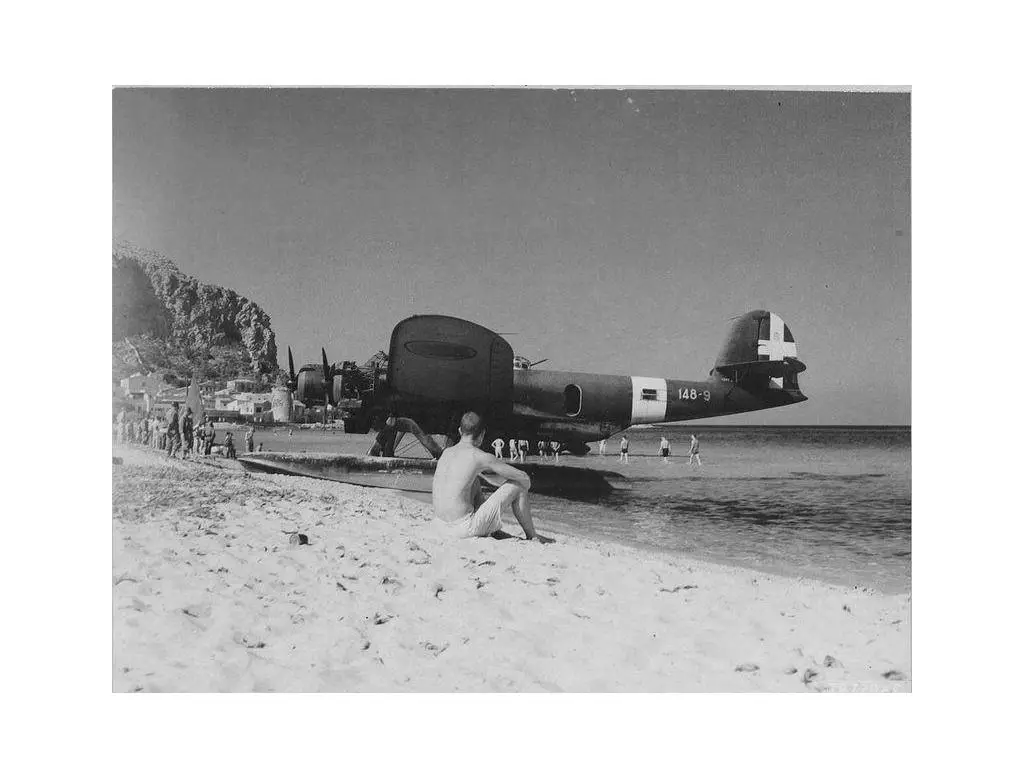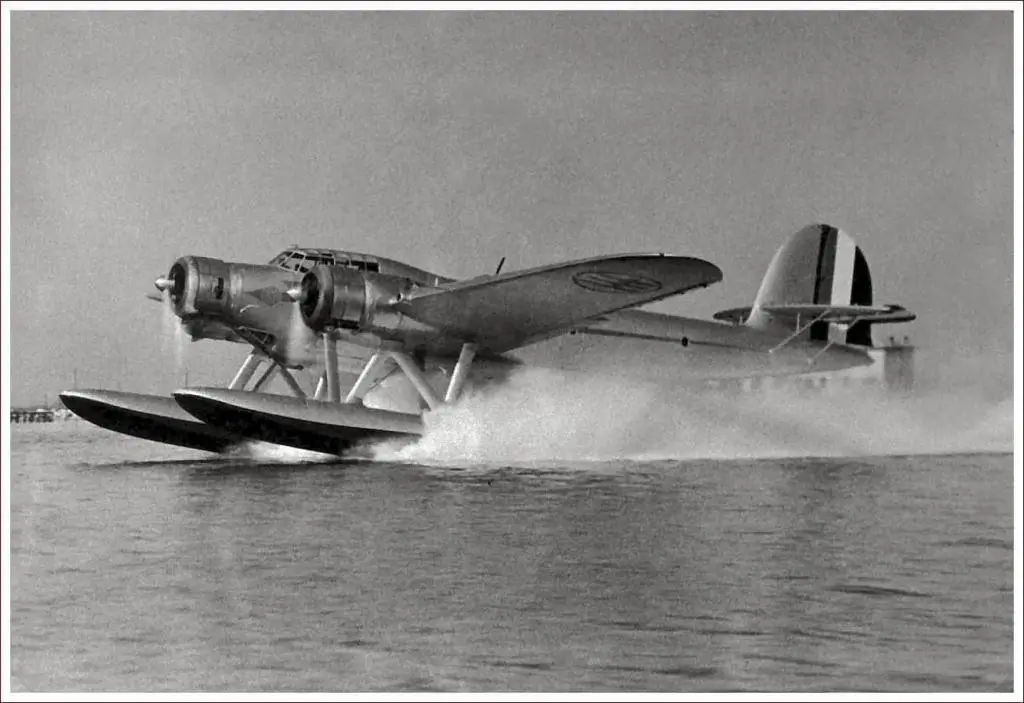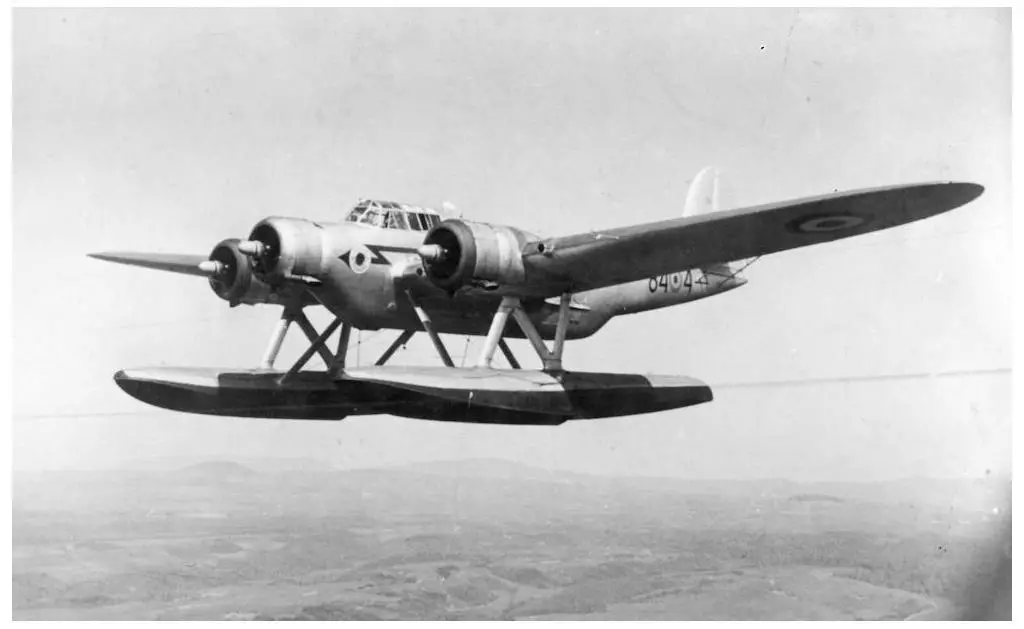Breaking Numerous Records
The Cantieri Aeronautici e Navali Triestini or CANT Z.506 Airone originated as a civilian transport plane. This large three-engine seaplane with lateral floats broke a considerable number of records. In 1936 alone, the chief test pilot established eight world records in its category over distances of 625 miles and 1,250 miles carrying payloads of up to two tons. It also broke two altitude records with a payload of two tons and five tons. In 1937, it broke speed records of traveling 3,100 miles at 191.56 mph, 1,250 miles at 198.70 mph and 625 miles at 200.18 mph. Subsequently, the Z.506 also established a distance record in a closed circuit covering 3,345.2 miles.

A CANT Z.506 parked at Modello Beach, Sicily in 1943.
Even bearing military insignia, the Z.506 continued to break records. In October 1937, it achieved a new ceiling record of 33,465 ft with a 2,000 lb payload. The CANT Z.506 followed this with a successful non-stop Atlantic crossing of 4,362 miles from Cadiz, Spain to Caraveles, Brazil.
Background on CANT Z.506
Designed by Filippo Zappata, the project began in 1935 and the commercial version prototype designated as Z.506A made its first flight on 19 August 1935. Production began immediately and the first 38 aircraft entered service in 1936. The aircraft bore the insignia of the Al Littoria airline, which utilized the aircraft for its Mediterranean routes.

A 1935 photo of a CANT Z.506B taking off.
The military version, the CANT Z.506B Airone, designed as a bomber and naval reconnaissance plane, appeared in October 1937. Structurally it was very similar to its civil counterpart. It was a three-engine low-wing monoplane seaplane made entirely in wood. It had a mixed wood and canvas covering, with the exception of the all-metal floats. The only external differences were the raised pilot’s cockpit and the deepening of the fuselage by means of a long pod in the belly, for use as bomb storage and an observation post.
The CANT Z.506B utilized three 750 hp Alfa Romeo 126 RC-34s engines powering three-bladed variable-pitch propellers. Defensive armament consisted of one 12.7 mm machine gun in the dorsal position and three 7.7 mm machine guns in the ventral and two beam positions. The aircraft’s bombload capacity is 2,650 lbs. It could achieve a top speed of 217 mph at 13,125 ft, a service ceiling was 22,965 ft and a range of 1,243 miles.
Service History
The Z.506Bs first operational debut took place during the Spanish Civil War. When Italy entered World War II, there were 97 of these aircraft in service with two naval bomber units and several reconnaissance squadrons. The aircraft saw fairly heavy action in Greece and participated in the capture of Corfu, Cefalonia, and Zante. As the war proceeded, the plane’s limitations soon became apparent. Because of that, it became relegated to naval reconnaissance, convoy escort, and air-sea rescue duties. After the Armistice, 23 Z.506Bs and 5 Z.506S flew to Allied ports for use by the Co-Belligerent forces.

CANT Z 506 B in flight
Production
The first units to receive the new aircraft were the 35th and the 31st naval bomber groups. The last CANT Z.506B came off the assembly line in January 1943 after 324 aircraft had been produced.
The Z.506’s career continued after the war. Thirty or so aircraft remained in service in the rescue role. The Z.506S Air-Sea Rescue variant remained with the Italian Air Force until 1960.
Specifications
| Model | CANT Z.506 |
|---|---|
| Crew | 5 |
| Powerplant | (3) Alfa Romeo 126 RC-34 Radial Engines 750 hp/ 560 kW |
| Maximum Speed | 232 mph (373 km/h) |
| Max Ceiling | 22,965 ft (7,000 m) |
| Range | 1,243 miles (2,000 km) |
| Length | 63.8 ft (19.45 m) |
| Height | 24.5 ft (7.465 m) |
| Weight | Empty: 18,298 lb (8,300 kg) Max: 28,010 lb (12,705 kg) |
| Wing Area | 999 Sq ft (92.8 m2) |
| Wingspan | 86.9 ft (26.5 m) |
| Armament | (1) 12.7 mm Breda SAFAT machine gun in dorsal position (3) 7.7 mm Breda-SAFAT machine guns in ventral and two beam positions Bomb Load up to 2,650 lbs (1,202 kg) |
Specifications source
Article by JDG.